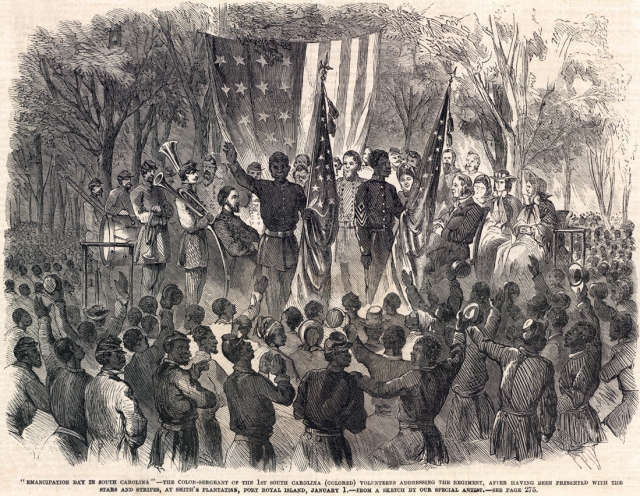Blacks Knew Full Well That Slavery Had Ended
From June 17:
‘What Are You So Afraid Of?’ Earns Praise
ABC News’ Rachel Scott Challenges Putin
N.Y. Times Joins in Juneteenth Celebration
IRE Hears Call for Change in Mindset on Diversity
News Carrier Sues, Claims Profiling, False Arrest
News Leaders Revamp Newsroom Diversity Count
NAHJ President Added to Masthead in San Antonio
Smiley Buys Radio Station, Plans Return to Air
70% of Black Caucus Consider Leaving UNC
Alex Mena, John Devine Rise at Miami Herald
Hong Kong Cops Arrest 5 at Pro-Democracy Paper
AP Won’t Run Names of Suspects in Minor Crimes
In homepage photo, the inscription reads, “Emancipation Day in South Carolina.” The color-sergeant of the 1st South Carolina (colored) addressing the regiment after having been presented with the Stars and Stripes, at Smith’s Plantation, Port Royal Island, January 1. From a sketch by our special artist . . . “:
Support Journal-isms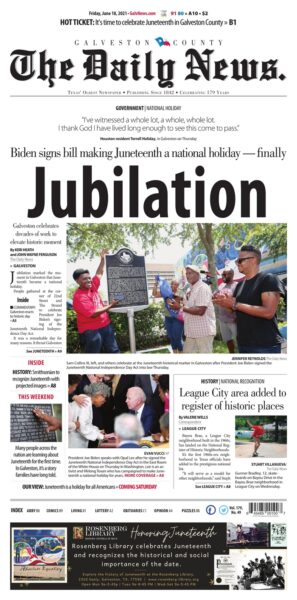
Blacks Knew Full Well That Slavery Had Ended
The popular story of the origin of Juneteenth — that the enslaved people in Galveston County, Texas, did not find out about the Emancipation Proclamation until Union troops told them they were free — is a myth, according to historians.
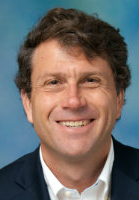 Those who were enslaved knew about the proclamation; it was the recalcitrant white slaveowners who had to be told by the troops that they could not continue to hold slaves, Gregory P. Downs (pictured), history professor at University of California – Davis, told Journal-isms Friday by telephone.
Those who were enslaved knew about the proclamation; it was the recalcitrant white slaveowners who had to be told by the troops that they could not continue to hold slaves, Gregory P. Downs (pictured), history professor at University of California – Davis, told Journal-isms Friday by telephone.
Downs wrote about the myth in 2015, citing other historians and historical sources. Since then, he said, others have added to the scholarship.
After the telephone conversation, Downs underscored by email, “I just wanted to emphasize that the piece I wrote in 2015 drew on the work of lots of scholars so I do want to make sure I emphasized that. I didn’t discover it! We are all following in DuBois’ wake and trying to catch up.”
The reference is to scholar and journalist W.E.B. Du Bois, one of several historians aware that the enslaved people kept abreast of Civil War developments.
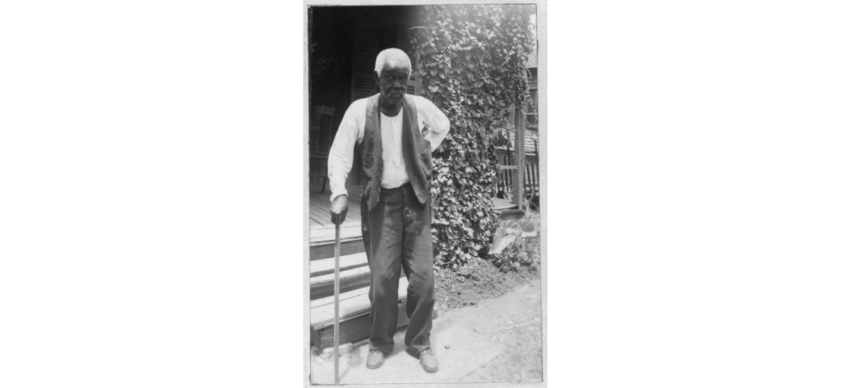
goin’ to get rich like the white folks. We thought we was goin’ to be richer than the white folks, ’cause
we was stronger and knowed how to work, and the whites didn’t and they didn’t have us to work for
them anymore. But it didn’t turn out that way. We soon found out that freedom could make folks proud
but it didn’t make ’em rich.” (Credit: Library of Congress)
They could point to interviews with the formerly enslaved, such as Felix Haywood, who was interviewed in 1936 at age 92, blind by then, in San Antonio, Texas.
“It’s a funny thing how folks always want to know about the War,” Haywood told an interviewer, his comments captured as part of the Slave Narrative Project of the larger Federal Writers’ Project.
“The war weren’t so great as folks suppose. Sometimes you didn’t knowed it was goin’ on. It was the endin’ of it that made the difference. That’s when we all wakes up that somethin’ had happened. Oh, we knowed what was goin’ on in it all the time, ‘cause old man Gudlow went to the post office every day and we knowed. We had papers in them days jus’ like now. . . .” The reference is to his former owner, William Gudlow.
That recollection contrasts with the popular description of Juneteenth, such as this from the Associated Press: “Juneteenth commemorates June 19, 1865, when Union soldiers brought the news of freedom to enslaved Black people in Galveston, Texas — two months after the Confederacy had surrendered. That was also about 2 1/2 years after the Emancipation Proclamation freed slaves in the Southern states.”
More prudently, it turns out, some media outlets went with the simpler explanation that the new Juneteenth holiday, signed into law Thursday by President Biden, simply “commemorates the end of slavery in the United States.”
Downs attributes the myth of Black ignorance to propaganda and the continuing assertion of white supremacy, which includes the “Lost Cause” portrayal of the secessionists as heroic and Black people as willingly servile or otherwise caricatured.
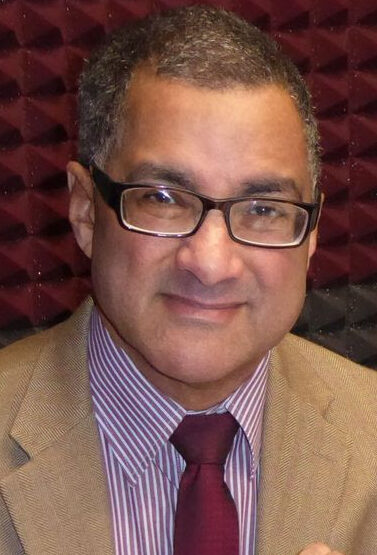 But its propagation irks Robin Washington (pictured), a founder of the Alliance of Black Jews and the Forward’s editor-at-large, who wrote in his Forward column on Friday, “I had bittersweet feelings about the history of the day.
But its propagation irks Robin Washington (pictured), a founder of the Alliance of Black Jews and the Forward’s editor-at-large, who wrote in his Forward column on Friday, “I had bittersweet feelings about the history of the day.
“I no longer do. I am outraged by it. . . . I now know, the big lie is the incessantly repeated canard that Galveston’s po’ ignant Black folks didn’t know they was free, and that U.S. Major Gen. Gordon Granger had to read a proclamation to spell it out for them.
“In fact, they most certainly did know.”
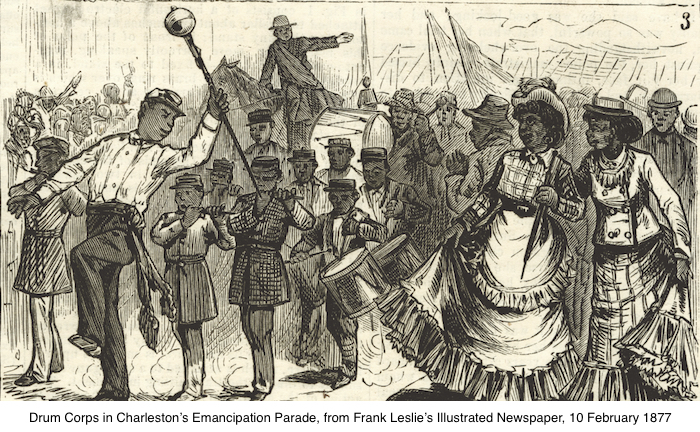
Washington cited Downs’ 2015 column and a subsequent conversation with him.
Downs had written, “If Haywood and other enslaved people knew about the Emancipation Proclamation, what exactly did the events of June 19, 1865 mean? Here we face a key forgotten reality about the end of the Civil War and slavery that has been shrouded in the mythology of Appomattox.
“The internecine conflict and the institution of slavery could not and did not end neatly at Appomattox or on Galveston Island. Ending slavery was not simply a matter of issuing pronouncements. It was a matter of forcing rebels to obey the law. To a very real extent, the Emancipation Proclamation and the 13th Amendment amounted to promissory notes of freedom. The real, on-the-ground work of ending slavery and defending the rudiments of liberty was done by the freedpeople in collaboration with and often backed by the force of the US Army.
“Granger’s proclamation may not have brought news of emancipation but it did carry this crucial promise of force. Within weeks, fifty thousand U.S. troops flooded into the state in a late-arriving occupation. These soldiers were needed because planters would not give up on slavery. . . .”
Downs also wrote, “To sustain slavery, some planters systematically murdered rebellious African-Americans to try to frighten the rest into submission. A report by the Texas constitutional convention claimed that between 1865 and 1868, white Texans killed almost 400 black people; black Texans, the report claimed, killed 10 whites. Other planters hoped to hold onto slavery in one form or another until they could overturn the Emancipation Proclamation in court.
“Against this resistance, the Army turned to force. In a largely forgotten or misunderstood occupation, the Army spread more than 40 outposts across Texas to teach rebels ‘the idea of law as an irresistible power to which all must bow.’ Freedpeople, as Haywood’s quote reminds us, did not need the Army to teach them about freedom; they needed the Army to teach planters the futility of trying to sustain slavery. . . .”
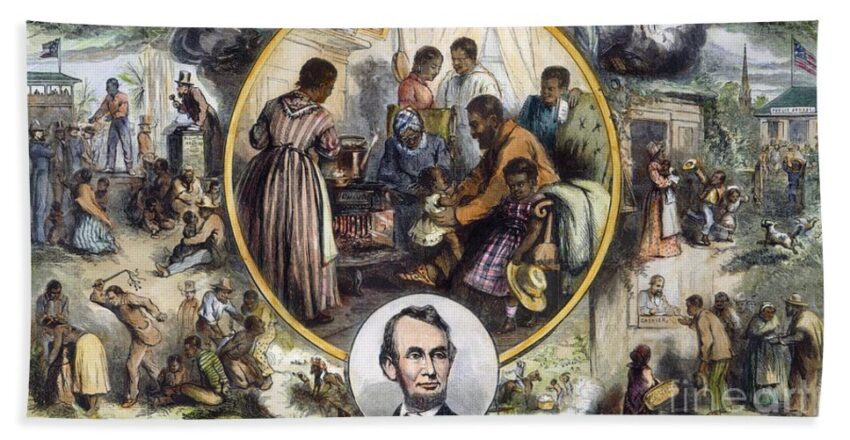
Downs told Journal-isms he was pleased that Juneteenth, which originated in Texas, had become a federal holiday. It is important symbolism, he said.
However, Downs noted, one shouldn’t forget other regional emancipation celebrations, such as:
- The Jan. 1 Emancipation Day Parade in Charleston, S.C., an annual tradition there since at least 1866. “When President Abraham Lincoln declared on Jan. 1, 1863, that enslaved people were free, they were still held in captivity in the Confederate stronghold of Charleston,” as the Post and Courier in that city reports.
- New Year’s Eve Watch Night in Beaufort, S.C. “On New Year’s Eve, 1862, those enslaved in the South gathered in plantation praise houses, churches and meeting halls, as did others as far away as Boston -— where Frederick Douglass and Sojourner Truth gathered [PDF],” according to the Gullah Geechee Cultural Heritage Corridor Commission. “The day they had never expected to come was here, and they wanted to give watch and bear witness to the coming of midnight and freedom. . . .”
- Aug. 8, Emancipation Day in Tennessee. “The reason for observing August 8th as opposed to January 1st or even September 22nd — the day Lincoln announced the preliminary Proclamation in 1862 — remains speculative,” says the Tennessee Historical Society. “Some note that Tennessee Military Governor Andrew Johnson freed his personal slaves on August 8, 1863, at his Greenville, Tennessee, farm. . . .”
- April 16, Emancipation Day in the District of Columbia. “On that day in 1862, President Abraham Lincoln signed the District of Columbia Compensated Emancipation Act,” Matt Pusatory reported for WUSA-TV. “With its signing, over 3,000 enslaved persons were freed eight months before the Emancipation Proclamation liberated slaves in the South. It’s also the only example of compensation by the federal government to former owners of emancipated slaves. . . .”
One reason for Downs’ enthusiasm for the new federal holiday, the historian said, is that “we’ve never really had a national holiday about the achievements and gains of the enslaved people.”
- Jared Alexander, The Grio: Sterling K. Brown, Maxine Waters and more to appear in theGrio’s ‘Juneteenth Live!’
- Susan D. Anderson, Los Angeles Times: The California connection to Juneteenth you probably didn’t learn in school
- Jenice Armstrong, Philadelphia Inquirer: Juneteenth is now a federal holiday. And that’s a good thing.
- Karen Grigsby Bates, Code Switch, NPR: A Taste Of Freedom
- Black Entertainment Television: #JuneteenthOnBET
- Jonathan Capehart, Washington Post: Transcript: Race in America: History Matters with Annette Gordon-Reed, Historian & Author, “On Juneteenth” (video)
- Michael Davis, National Archives News: Noted Historian [Annette Gordon-Reed] Discusses Juneteenth’s Place in American History
- Editorial, Buffalo News: Efforts to whitewash U.S. history prove the value in celebrating Juneteenth
- Editorial, Dallas Morning News: Happy first-ever national Juneteenth
- Editorial, Richmond (Va.) Times-Dispatch: Commemorating Juneteenth, our new national holiday
- Taryn Finley, HuffPost Black Voices: The Hypocrisy Of Honoring Juneteenth While Condemning Critical Race Theory
- Clyde W. Ford, Los Angeles Times: Without a U.S. plan for reparations, Juneteenth is a hollow national holiday
- Renée Graham, Boston Globe: A Juneteenth holiday is symbolic. Don’t confuse it with racial justice.
- Kaitlyn Greenidge, New York Times: What Walmart Doesn’t Get About Juneteenth
- Emil Guillermo, Asian American Legal Defense and Education Fund: Juneteenth and Vincent Chin’s June 19th
- Michael Harriot, The Root: Make Juneteenth Great Again: The Caucasians’ Guide to Celebrating Juneteenth
- Victoria Hernandez, Los Angeles Times: On Juneteenth, Kareem Abdul-Jabbar’s ‘Fight the Power’ tackles the history of protest
- Jon Jeter, Minnesota Spokesman-Recorder: Juneteenth: a tribute to Blacks’ unflinching will to be free
- Roy S. Johnson, al.com: I’ll take this new Juneteeth national holiday and everything it should not obscure
- Felice León, The Root: Commemorating Hope: On Juneteenth Author Annette Gordon-Reed Reflects on the Meaning of the Holiday
- Leonardo March, Haitian Times: Haitian-American activists reflect on Juneteenth
- Kate Masur, New York Times: Juneteenth Reminds Us Just How Far We Have to Go
- Greg Moore, Arizona Republic: Liberal clash over Juneteenth is predicable and laughable. We can walk and chew gum
- Greg Moore, Arizona Republic: What is Juneteenth and why is it important? What history, and life as a Black man, tell me
- Mark H. Morial, National Urban League: Juneteenth is Opportunity to Confront the Nation’s ‘Hard History’
- Askia Muhammad, Washington Informer: White Americans Murdering Truth
- Tony Norman, Pittsburgh Post-Gazette: Independence Day, June 19, 1865
- Clarence Page, Chicago Tribune: The Historic Latta Plantation controversy reminds us what Juneteenth can teach us
- Isabella Grullón Paz, New York Times: Most Americans Know Little or Nothing About Juneteenth, Poll Finds
- Catherine Pearson, HuffPost: How To Teach Your Child About Juneteenth
- Leonard Pitts Jr., Miami Herald: That ‘well-regulated militia?’ It was originally created to quell rebellions of the enslaved, prof says
- Eugene Robinson, Washington Post: Recognizing Juneteenth as a federal holiday is a hollow victory
- Kevin Siers, Charlotte Observer and News and Observer, Raleigh, N.C.: Politics never takes a holiday (cartoon)
- Michael A. Smith, Daily News, Galveston County, Texas: Americans should support Juneteenth National Independence Day Act (editorial, June 4)
- Will Sutton, nola.com: Hooray for Juneteenth, but a holiday isn’t enough. We need voting rights, equality.
- Brittany Wong, HuffPost Black Voices: Don’t Treat Juneteenth As Another Day Off. Do This Instead.
- Kevin Young, New York Times: Juneteenth Is a National Holiday. Now Can It Still Be Black?
‘What Are You So Afraid Of?’ Earns Praise
June 17, 2021
ABC News’ Rachel Scott Challenges Putin
N.Y. Times Joins in Juneteenth Celebration
IRE Hears Call for Change in Mindset on Diversity
News Carrier Sues, Claims Profiling, False Arrest
News Leaders Revamp Newsroom Diversity Count
NAHJ President Added to Masthead in San Antonio
Smiley Buys Radio Station, Plans Return to Air
70% of Black Caucus Consider Leaving UNC
Alex Mena, John Devine Rise at Miami Herald
Hong Kong Cops Arrest 5 at Pro-Democracy Paper
AP Won’t Run Names of Suspects in Minor Crimes
ABC News’ Rachel Scott Challenges Putin
“ABC News’ Rachel Scott is earning praise in the journalism world” for challenging Russian President Vladimir Putin during a press conference Wednesday following his meeting with President Biden, Tom Jones wrote Thursday for the Poynter Institute.
“She started off by asking, ‘President Biden has said he will respond if cyberattacks from Russia do not stop. I’m curious, what did he tell you? Did he make any threats? And a quick follow-up if I may, sir. The list of your political opponents who are dead, imprisoned or jailed is long. Alexei Navalny’s organization calls for free and fair elections, an end to corruption, but Russia has outlawed that organization, calling it extremist. And you now have prevented anyone who supports him to run for office. For my question for you Mr. President: What are you so afraid of?’
“Putin started with what appeared to be an irritated response by saying, through a translator, ‘I have already spoken to your colleagues. Now I have to repeat that to you.’ He then went on a rambling whataboutism answer, trying to make comparisons between Russia and the U.S. He pointed to arrests of political opponents in Russia to that of those arrested in Black Lives Matter protests, and, incredibly, the insurrection on Jan. 6.
“Scott called out Putin in her follow-up, saying, ‘You didn’t answer my question, sir. If all of your political opponents are dead or in prison, poisoned, doesn’t that send a message that you do not want a fair political fight?’ . . . .
“After the exchange, Washington Post opinion writer Jennifer Rubin tweeted, ‘Rachel Scott early contender for person of the week.’
“MSNBC’s Joy Reid tweeted that Scott was hitting Putin with ‘tough questions’ and that she was ‘doing it ALLLL!!!’
- Charles M. Blow, New York Times: The World’s Dictators Exploit America’s Racism
- Andy Meek, Forbes: Meet ABC News’ Rachel Scott, Who Looked Putin In The Eye And Asked Him: ‘What Are You So Afraid Of?’
A history of Black people in Texas, filtered through Juneteeth.
N.Y. Times Joins in Juneteenth Celebration
“Celebrate Juneteenth with The Times’s Veronica Chambers as we explore Black joy in all its forms — from the energizing power of togetherness to restorative moments of solitude,” the New York Times urged Thursday. “From the love we show each other to the joy of loving who we are.
“The event was to take place June 17 at 5 p.m. E.T. Viewers could R.S.V.P. free of charge.
“Join Ahmir ‘Questlove’ Thompson as he discusses Summer Of Soul, his powerful new documentary and the energizing power of togetherness with The Times’s Pierre-Antoine Louis. Make joyful noise with an exclusive performance and conversation from the GRAMMY-winning bassist and listener Esperanza Spalding as she talks to The Times’s Charlie Brinkhurst-Cuff. . . .”
Further update on a holiday that didn’t legally exist 24 hours ago, from @terencesamuel to @MorningEdition staff: “On a holiday meant to celebrate liberation, I am cancelling today’s pitch meeting so we can all move some time back to the life side of the work-life balance sheet.”
— Steve Inskeep (@NPRinskeep) June 18, 2021
President Biden signed legislation on Thursday to make Juneteenth a federal holiday, enshrining June 19 as the national day to commemorate the end of slavery in the United States, as the Times’ Annie Karni and Luke Broadwater reported.
- Zack Beauchamp, Vox: Next time someone says the Civil War wasn’t about slavery, show them this (Aug. 12, 2015)
- Black News Channel: BNC Raises The Bar On Juneteenth Coverage To Create Premier TV Destination For Emancipation Day Celebrations
- Gillian Brockell, Kate Rabinowitz and Frank Hulley-Jones, Washington Post: Juneteenth (interactive)
- Chelsey Cox, USA Today: Who are the 14 House Republicans who voted against a Juneteenth holiday? And why?
- Mary C. Curtis, CQ Roll Call: Who is afraid of critical race theory? (podcast)
- Mary Elliott, Kelly E. Navies and Angela Tate, Smithsonian: What is Juneteenth?
- Annette Gordon-Reed with Susan Swain, C-SPAN: Discussion of Gordon-Reed’s “On Junteenth“ (June 1)
- Angelique Jackson, Variety: Why 94-Year-Old Activist Opal Lee Marched to Make Juneteenth a National Holiday
- Nick Visser, HuffPost: The Pathetic Reasons House GOPers Voted Against Making Juneteenth A Federal Holiday
- Robin Washington, Forward: What really happened on Juneteenth — and why it’s time for supremacists and their sympathizers to surrender (June 18)
IRE 21 Keynote Speech from IRE/NICAR on Vimeo.
IRE Hears Call for Change in Mindset on Diversity
In a keynote address at the virtual conference Wednesday of Investigative Reporters and Editors, Ron Nixon noted the need for more investigative reporters of color and urged news organizations to “take the same approach” as they do to locating documents and fruitful news sources “to find Black, Latino, Asian, Native journalists for our teams.”
Nixon, global investigations editor at the Associated Press and a Black journalist, said, “We have to view this as a mindset, it’s not a numbers game.”
To the roster of acronyms such as “DEI,” for “diversity, equity and inclusion,” Nixon added “PHG”:
“promote, hire and grow.” That is, promote people internally, hire people but expand your networks, and “grow your talent,” even if they don’t check all the boxes. “And that’s OK, because nobody does,” Nixon said.
Meanwhile, IRE announced, “IRE is returning to in-person events with a symposium in Baltimore in October focusing on diversity, belonging, equity and inclusion (DBEI) issues for newsrooms. . . . The symposium will focus on helping journalists with newsroom diversity issues and with investigating inequality in their communities, from education and labor to housing and criminal justice. . . .”
Denise Malan, IRE deputy executive director, messaged Thursday, “We just passed 2,000 today for total attendance.”
- News Leaders Association: 2021 NLA News Leader of The Year: Ron Nixon, Associated Press (video)

News Carrier Sues, Claims Profiling, False Arrest
“A Black newspaper carrier confronted by Pierce County Sheriff Ed Troyer in January has filed a legal claim against the county, seeking at least $5 million in damages,” Jim Brunner reported Wednesday for the Seattle Times.
“Attorneys representing Sedrick Altheimer submitted the tort claim Tuesday, contending Troyer’s actions during the controversial Jan. 27 incident violated Altheimer’s constitutional rights and caused him ‘severe emotional distress.’ . . .”
Brunner also wrote, “Asked for comment Wednesday, Troyer did not directly address the tort claim, but said in an email he welcomes a ‘complete, full and independent investigation’ and that he and his office will be ‘fully cooperative.’
“Altheimer, 24, was driving his regular delivery route Jan. 27 when Troyer began following him in his personal SUV.
“The two wound up in a 2 a.m. standoff in which Troyer called emergency dispatchers, repeatedly saying Altheimer had threatened to kill him.
“That call sparked a massive police response, with more than 40 units from various police agencies rushing toward the scene. Most were called off after Tacoma police arrived, but Altheimer was’confronted at gun point, removed from his vehicle [and] frisked for weapons all while trying to explain he was at work,’ the tort claim states. . . .”
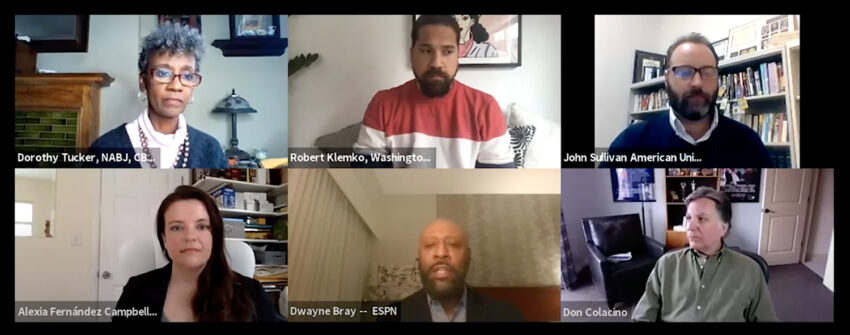
News Leaders Revamp Newsroom Diversity Count
Noting that “the news industry . . . is grappling with its biased legacy and how better to amplify the voices of more communities,” the News Leaders Association Monday announced a pilot program that it hopes will succeed its newsroom diversity survey, which fell victim to low participation.
“The new demographic census includes a number of key changes:
- “Expanding multiple racial and ethnic identities
- “Open-ended options to allow participants to designate identity on their own terms
- “Expanding the definition of diversity to explicitly include social class and social mobility
- “Formal inclusion of data points to recognize LGBTQIA+ identifying journalists, journalists with disabilities, and journalists with military backgrounds
- “Providing individual journalists with the ability to self-report, while maintaining confidentiality
- “Centering the narratives of journalists from marginalized groups to contextualize the numerical data
“As part of the changes, NLA has launched the Transformative Transparency Exchange, a monthly facilitated group that offers an open dialogue about news media’s failure to meaningfully integrate. The first three sessions have centered the narratives and needs of women in leadership, caregivers, and journalists who identify as Asian American and Pacific Islanders. The next event will focus on LGBTQ+ journalists . . . .”
The News Leaders Association was created through a merger of the American Society of News Editors and Associated Press Managing Editors.
NAHJ President Added to Masthead in San Antonio
Realizing that “our print masthead displayed only the names of three white men,” the San Antonio Express-News has added four women: associate editorial page editor Nancy M. Preyor-Johnson, Nora López, executive editor of news, Randi Stevenson, executive producer of ExpressNews.com, and Jess Elizarraras, executive producer of MySA.com.
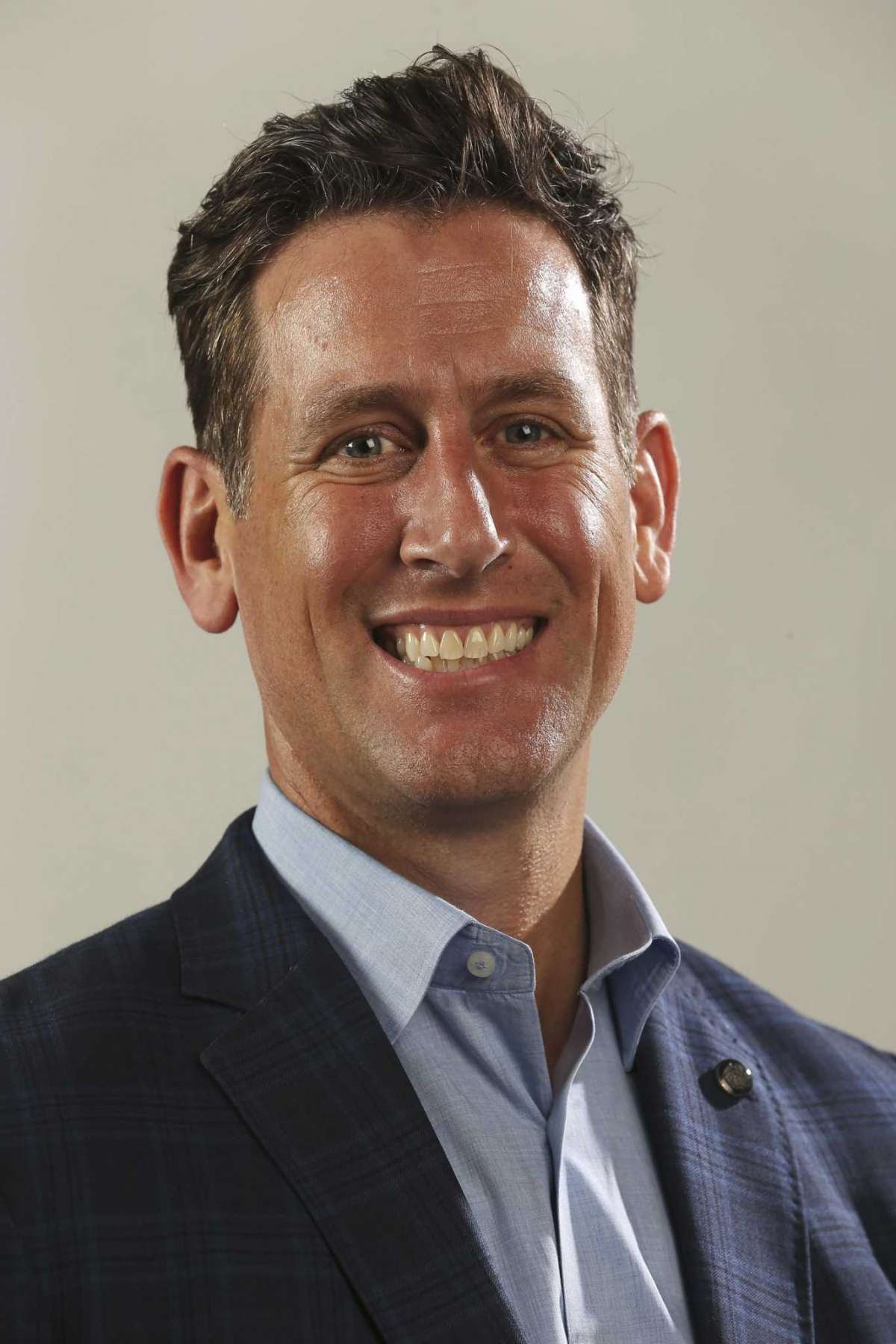 Mark Medici (pictured), Express-News publisher, made the announcement Friday in an Express-News column. Lopez, who had been Metro editor, is president of the National Association of Hispanic Journalists.
Mark Medici (pictured), Express-News publisher, made the announcement Friday in an Express-News column. Lopez, who had been Metro editor, is president of the National Association of Hispanic Journalists.
 Express-News Editor Marc Duvoisin (pictured) messaged Journal-isms Thursday, “Nora’s duties have changed significantly with her promotion.
Express-News Editor Marc Duvoisin (pictured) messaged Journal-isms Thursday, “Nora’s duties have changed significantly with her promotion.
“Most important, she will lead a restructuring of the metro newsroom intended to accelerate our growth in digital subscriptions.
“She also has assumed responsibility for selecting each day’s front page stories, a job traditionally done by the Express-News editor-in-chief.
 “Also, Nora (pictured) is now a member of the Express-News Operating Committee, made up of senior leaders of the advertising, finance, printing and distribution, HR and other departments. It meets weekly.”
“Also, Nora (pictured) is now a member of the Express-News Operating Committee, made up of senior leaders of the advertising, finance, printing and distribution, HR and other departments. It meets weekly.”
In a June 10 staff note, Duvoisin added, “Nora is a rarity – a committed journalist who’s able to organize other journalists to do stuff. She’s a natural leader, in other words. Since becoming metro editor in 2012, she has nurtured outstanding journalism, put out innumerable fires and kept the newsroom on an even keel.
“Nora was born in Mexico, grew up in Edinburg in the Rio Grande Valley and earned a bachelor’s degree in communications from Pan American University (now UT-Pan American). After graduating, she signed on as a reporting intern for the Express-News. Then she moved to the rival San Antonio Light, where she was a police reporter until the paper closed in January 1993.
“Her next stop was the Dallas Morning News, where she covered cops, crime and education. In 2000, she returned to the Express-News. She worked on the projects team before becoming criminal justice editor. In 2003, she was named state editor, overseeing coverage of the Texas Legislature and managing bureaus in Washington and the Rio Grande Valley.
“She became a U.S. citizen in 2008.
“Nora is a champion of newsroom diversity and has held many leadership roles in the profession, including as a board member and president of the San Antonio Association of Hispanic Journalists. Last year, she was elected to a two-year term as president of the National Association of Hispanic Journalists. . . .”
- San Antonio Express-News: Lessons from their legacies: Black elders in San Antonio sit down with journalists of color to share their stories, experiences and reflections on being Black in America.
- Associated Press: Winfrey, Hearst have Black journalists tell elders’ stories
Smiley Buys Radio Station, Plans Return to Air
“Three years after workplace misconduct allegations cost veteran TV and radio talk-show host Tavis Smiley his job and a national forum, he’s ending his silence,” Lynn Elber reported Thursday for the Associated Press.
“Smiley, who continues to deny the claims of unwanted sexual behavior that led PBS to drop his long-running show, is attempting to rebound with the purchase of a Los Angeles radio station that will offer a Black and progressive perspective on the city and nation.
“Sidelined during a period of landmark racial upheaval, Smiley decided to make his own opportunity with reformatted station KBLA-AM Talk 1580 Los Angeles. It debuts with a preview on Saturday, the Juneteenth holiday commemorating when the last enslaved African Americans learned they were free.
“ ‘While I was watching this racial reckoning last summer, it was so clear to me that people were being heard to some degree, but there were no African American-owned platforms where people had their voice on a regular basis,’ Smiley said. The media can lose interest when protests stop, he said, but the issues ‘that matter to us don’t go away.’
“He was also chafing at the isolation. . . .”
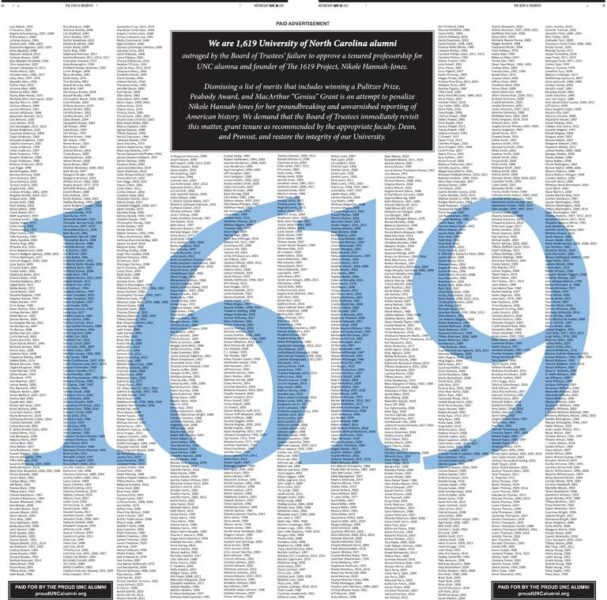
70% of Black Caucus Consider Leaving UNC
The drama over the decision not to offer tenure to Nikole Hannah-Jones has caused 70 percent of University of North Carolina Black Caucus members to consider leaving the university, the caucus announced Wednesday. It added that more than half are actively job searching outside the institution.
Meanwhile, Hannah-Jones, the New York Times Magazine reporter who won a Pulitzer Prize for “The 1619 Project,” criticized the news media for echoing Republicans in conflating critical race theory with her project.
 “Wedding these together is working so successfully,” Hannah-Jones (pictured) told Joy Reid Monday on MSNBC’s “The ReidOut.” “And, frankly, the media has played a big role in that, right, because they were allowing Republicans to really lead with this idea that, oh, look at this bad diversity training. That`s critical race theory gone amok.
“Wedding these together is working so successfully,” Hannah-Jones (pictured) told Joy Reid Monday on MSNBC’s “The ReidOut.” “And, frankly, the media has played a big role in that, right, because they were allowing Republicans to really lead with this idea that, oh, look at this bad diversity training. That`s critical race theory gone amok.
“Those two things are not related whatsoever.”
As Benjamin Wallace-Wells wrote last week in The New Yorker, critical race theory is “a scholarly movement [ascendant] during the nineties, the adherents of which argue that white supremacy is encoded in law and in the structure of American institutions.”
The Times defines “The 1619 Project,” unveiled in 2019, as “a landmark undertaking that connected the centrality of slavery in U.S. history with an unflinching account of the brutal racism that endures in so many aspects of American life today.”
Matt Talhelm and Bryan Mims, reporters at wral.com in Raleigh, N.C., quoted UNC Black Caucus members. “It’s a really hard time to be at Carolina and to lift up the values we thought we shared, but are clearly not the same,” said Dawna Jones, a caucus member.
Talhelm and Mims also wrote, “UNC-Chapel Hill has few Black women with tenure. According to data from the National Center for “Education Statistics, out of the 622 professors with tenure at the school during the 2019-20 school, only eight were Black women. . . .”
- American Society of Magazine Editors: ASME Statement on Legislation Forbidding the Use of the 1619 Project in Schools
- Eric Easter, Washington Post: CNN’s Don Lemon: ‘We’re living in two different realities as Black and White people‘
- Tyler Kingkade, Brandy Zadrozny and Ben Collins, NBC News: Critical race theory battle invades school boards — with help from conservative groups
- Sergio Munoz, Media Matters for America: Right-wing “critical race theory” attacks are supercharging a racist movement to undo decades of civil rights advancement
- Lamar Richards, NC Policy Watch: Chapel Hill student body president: It’s past time for a genuine reckoning at UNC
- Nareissa Smith, Charlotte Observer: Nikole Hannah-Jones may have a First Amendment case
- Deborah Stroman, medium.com: Fury and Forgiveness: Confessions of a UNC Black Faculty Alumna
- Valerie Strauss and John Duffy, Washington Post: Professor: Why I teach the much-debated 1619 Project — despite its flaws
- Benjamin Wallace-Wells, New Yorker: What Do Conservatives Fear About Critical Race Theory?
- Benjamin Wallace-Wells, New Yorker: How a Conservative Activist Invented the Conflict Over Critical Race Theory (June 18)
Alex Mena, John Devine Rise at Miami Herald
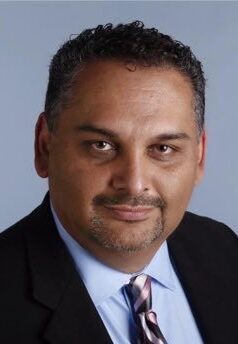 Miami Herald Sports Editor Alex Mena (pictured) has been promoted to deputy managing editor – digital and will oversee el Nuevo Herald, Executive Editor Monica Richardson announced. Assistant Sports Editor John Devine (pictured below) will become sports editor.
Miami Herald Sports Editor Alex Mena (pictured) has been promoted to deputy managing editor – digital and will oversee el Nuevo Herald, Executive Editor Monica Richardson announced. Assistant Sports Editor John Devine (pictured below) will become sports editor.
Richardson said of Mena in a statement Thursday:
“Alex has served the Miami newsroom as a leader wearing many different hats. He will continue to lead our news operations with a focus on digital growth for all our products. He will also oversee elNuevo Herald as part of this promotion.
“Alex, a member of the National Association of Hispanic Journalists and Associated Press Sports Editors, started his career at the Miami Herald in 1993 as a sports clerk. In his time at the Herald, he has covered high school games, worked as a designer, copy editor, assistant sports editor, deputy sports editor and news editor and sports editor. He had a two-year stint at the South Florida Sun Sentinel where he worked as a designer and copy editor.
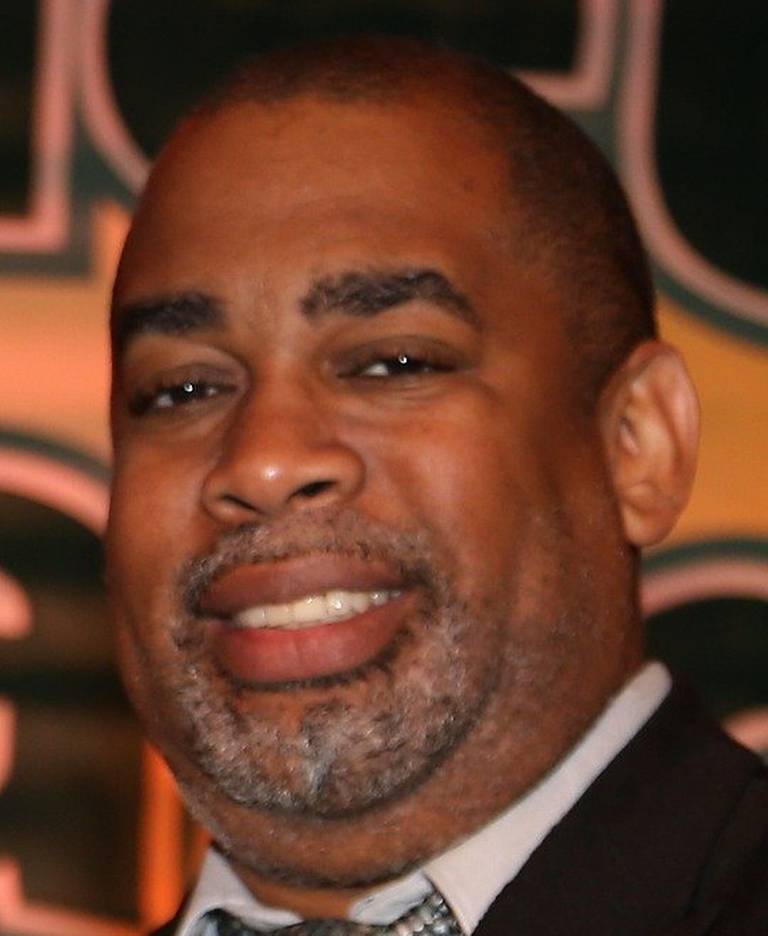 Richardson said of Devine: “John will ensure that we are smartly connecting with our sports audience on the content that matters most to them. He has been a leader for many years across the newsroom and, among other things, a pioneer with the growth of our sports podcasts.
Richardson said of Devine: “John will ensure that we are smartly connecting with our sports audience on the content that matters most to them. He has been a leader for many years across the newsroom and, among other things, a pioneer with the growth of our sports podcasts.
“He has devoted his time to the Herald’s efforts to branch out in the community with the spelling bee and Silver Knights program. John rejoined the Miami Herald in 1996 after stints at the Orlando Sentinel and Dallas Morning News. He is a member of Associated Press Sports Editors and the National Association of Black Journalists.”
Richardson also wrote, “The Miami Herald will soon begin a search for an Economic Opportunity and Business Development Editor. Our business, real estate, economic and growing technology coverage is more important now than ever in Miami/South Florida.”
Last September, Miami Herald Metro Editor Jay Ducassi was named interim editor of el Nuevo Herald, with assistance with Maru Antunano. The shakeup was part of the fallout from distribution of what the company called “deeply offensive and racist content” in Libre, an independently produced weekly newspaper focused on Cuban exiles that for about eight months had been inserted each Friday into el Nuevo Herald.
Ducassi will return to his role as senior editor for the Lat/Am-Caribbean team, Richardson said.
- Lisa Wilson, Associated Press Sports Editors: Diversity Pledge: Miami Herald is seeking a Dolphins beat reporter (June 10)
Hong Kong Cops Arrest 5 at Pro-Democracy Paper
“Hong Kong police used a sweeping national security law Thursday to arrest five editors and executives of a pro-democracy newspaper on charges of colluding with foreign powers — the first time the legislation has been used against the press in yet another sign of an intensifying crackdown by Chinese authorities in the city long known for its freedoms,” Zen Soo reported for the Associated Press.
“Police said they had evidence that more than 30 articles published by Apple Daily played a ‘crucial part’ in what they called a conspiracy with foreign countries to impose sanctions against China and Hong Kong.
“The newspaper said in a statement that the move left it ‘speechless’ but vowed to continue its reporting and even invited other media outlets to watch the Friday editions roll off the presses, a show of its commitment to continue its work. . . .”
AP Won’t Run Names of Suspects in Minor Crimes
From June 16 posting:
“The Associated Press said Tuesday it will no longer run the names of people charged with minor crimes, out of concern that such stories can have a long, damaging afterlife on the internet that can make it hard for individuals to move on with their lives,” David Bauder reported for the Associated Press.
“In so doing, one of the world’s biggest newsgathering organizations has waded into a debate over an issue that wasn’t of much concern before the rise of search engines, when finding information on people often required going through yellowed newspaper clippings.
“Often, the AP will publish a minor story — say, about a person arrested for stripping naked and dancing drunkenly atop a bar — that will hold some brief interest regionally or even nationally and be forgotten the next day.
“But the name of the person arrested will live on forever online, even if the charges are dropped or the person is acquitted, said John Daniszewski, AP’s vice president for standards. And that can hurt someone’s ability to get a job, join a club or run for office years later. . . .”
Bauder also wrote, “The AP has resisted efforts to get stories removed altogether. It has long had a policy of clarifying or updating even very old stories with news of an acquittal, for example, ‘but a story that is truthful and accurate on the day we wrote it, we’d consider that sacrosanct,’ Daniszewski said. ‘We’re not going to rewrite history.’ . . .”
- John Daniszewski, Associated Press: Why we’re no longer naming suspects in minor crime stories
- Claire Wang, NBCU Academy: Why some local news outlets won’t post mugshots — and are reimagining the crime beat
Support Journal-isms
To subscribe at no cost, please send an email to journal-isms+subscribe@groups.io and say who you are.
Facebook users: “Like” “Richard Prince’s Journal-isms” on Facebook.
Follow Richard Prince on Twitter @princeeditor
Richard Prince’s Journal-isms originates from Washington. It began in print before most of us knew what the internet was, and it would like to be referred to as a “column.” Any views expressed in the column are those of the person or organization quoted and not those of any other entity. Send tips, comments and concerns to Richard Prince at journal-isms+owner@
View previous columns (after Feb. 13, 2016).
View previous columns (before Feb. 13, 2016)
- Diversity’s Greatest Hits, 2018 (Jan. 4, 2019)
- Book Notes: Is Taking a Knee Really All That? (Dec. 20, 2018)
- Book Notes: Challenging ’45’ and Proudly Telling the Story (Dec. 18, 2018)
- Book Notes: Get Down With the Legends! (Dec. 11, 2018)
- Journalist Richard Prince w/Joe Madison (Sirius XM, April 18, 2018) (podcast)
- Richard Prince (journalist) (Wikipedia entry)
- February 2018 Podcast: Richard “Dick” Prince on the need for newsroom diversity (Gabriel Greschler, Student Press Law Center, Feb. 26, 2018)
- Diversity’s Greatest Hits, 2017 — Where Will They Take Us in the Year Ahead?
- Book Notes: Best Sellers, Uncovered Treasures, Overlooked History (Dec. 19, 2017)
- An advocate for diversity in the media is still pressing for representation, (Courtland Milloy, Washington Post, Nov. 28, 2017)
- Morgan Global Journalism Review: Journal-isms Journeys On (Aug. 31, 2017)
- Diversity’s Greatest Hits, 2016
- Book Notes: 16 Writers Dish About ‘Chelle,’ the First Lady
- Book Notes: From Coretta to Barack, and in Search of the Godfather
- Journal-isms’ Richard Prince Wants Your Ideas (FishbowlDC, Feb. 26, 2016)
- “JOURNAL-ISMS” IS LATEST TO BEAR BRUNT OF INDUSTRY’S ECONOMIC WOES (Feb. 19, 2016)
- Richard Prince with Charlayne Hunter-Gault,“PBS NewsHour,” “What stagnant diversity means for America’s newsrooms” (Dec. 15, 2015)
- Book Notes: Journalists Follow Their Passions
- Book Notes: Journalists Who Rocked Their World
- Book Notes: Hands Up! Read This!
- Book Notes: New Cosby Bio Looks Like a Best-Seller
- Journo-diversity advocate turns attention to Ezra Klein project (Erik Wemple, Washington Post, March 5, 2014)

